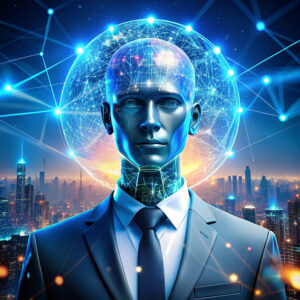Real Jobs Created by AI and Automation
Jobs created by AI have been on the rise in recent years, as the rapid advancement of artificial intelligence (AI) and automation has transformed the job market, leading to the emergence of new and exciting career opportunities. While some fear that AI may replace human workers, the truth is that it has also created a plethora of jobs that didn’t exist before. As we navigate this new landscape, it’s essential to explore the various jobs created by AI and automation. In this article, we’ll delve into 10 exciting jobs created by AI that you need to know about, showcasing the potential of jobs created by AI.
We strongly recommend that you check out our guide on how to take advantage of AI in today’s passive income economy.
Table of Contents
1. AI Ethics Officer
As AI continues to play a more significant role in our lives, the demand for AI Ethics Officers has grown exponentially. These professionals are responsible for ensuring that AI systems are developed and used in an ethical and responsible manner. They work closely with AI developers and stakeholders to identify potential ethical concerns and develop guidelines to address them. AI Ethics Officers are crucial in maintaining trust in AI systems and ensuring that they benefit society as a whole. This is one of the most important jobs created by AI, as it helps to mitigate the potential negative consequences of AI misuse.
2. AI-Assisted Healthcare Technician
The healthcare industry has been one of the biggest beneficiaries of AI and automation. AI-Assisted Healthcare Technicians work alongside medical professionals, leveraging AI tools to improve patient care and outcomes. They use AI algorithms to analyze medical data, identify patterns, and provide insights that help doctors make more accurate diagnoses and treatment plans. These technicians also assist in developing and maintaining AI-powered medical devices, such as robotic surgical systems. As one of the jobs created by AI, AI-Assisted Healthcare Technicians are making a significant impact on the quality and efficiency of healthcare delivery.
3. Autonomous Vehicle Technician
With the rise of self-driving cars and trucks, the demand for Autonomous Vehicle Technicians has skyrocketed. These technicians are responsible for maintaining, repairing, and upgrading the complex systems that power autonomous vehicles. They work with a wide range of technologies, including sensors, cameras, and AI software, to ensure that these vehicles operate safely and efficiently. Autonomous Vehicle Technicians are essential in the development and deployment of self-driving vehicles, making this one of the most exciting jobs created by AI and automation.
4. AI-Powered Chatbot Designer
Chatbots have become ubiquitous in customer service, e-commerce, and various other industries. AI-Powered Chatbot Designers are responsible for creating and optimizing these virtual assistants to provide seamless, human-like interactions with customers. They use natural language processing (NLP) and machine learning techniques to train chatbots to understand and respond to user queries effectively. As businesses continue to adopt chatbots to improve customer experience and streamline operations, the demand for skilled AI-Powered Chatbot Designers will only continue to grow, solidifying its position as one of the key jobs created by AI.
5. AI Research Scientist
At the forefront of AI development are AI Research Scientists. These highly skilled professionals conduct cutting-edge research to advance the field of artificial intelligence. They work on developing new AI algorithms, architectures, and techniques that can be applied across various industries. AI Research Scientists often collaborate with academia and industry partners to push the boundaries of what’s possible with AI. As one of the most influential jobs created by AI, AI Research Scientists play a crucial role in shaping the future of technology and its impact on society.
6. AI-Assisted Cybersecurity Analyst
Cybersecurity is a critical concern for businesses and individuals alike. As cyber threats become more sophisticated, the need for advanced cybersecurity solutions has grown. AI-Assisted Cybersecurity Analysts leverage AI tools to detect, prevent, and respond to cyber attacks in real-time. They use machine learning algorithms to analyze vast amounts of data, identify anomalies, and detect potential threats before they can cause damage. These analysts also work on developing new AI-powered cybersecurity solutions to stay ahead of evolving threats. As one of the jobs created by AI, AI-Assisted Cybersecurity Analysts are essential in protecting our digital infrastructure.
7. AI-Enhanced Marketing Specialist
Marketing has always been a data-driven field, but with the advent of AI, it has become even more sophisticated. AI-Enhanced Marketing Specialists use AI tools to analyze customer data, predict consumer behavior, and optimize marketing campaigns for maximum impact. They leverage machine learning algorithms to personalize marketing messages, improve target audience segmentation, and automate repetitive tasks. As businesses increasingly rely on data-driven insights to guide their marketing strategies, the demand for AI-Enhanced Marketing Specialists will continue to rise, making it one of the most promising jobs created by AI.
8. AI-Assisted Financial Analyst
The financial industry has been quick to adopt AI and automation to improve efficiency and accuracy. AI-Assisted Financial Analysts use AI tools to analyze vast amounts of financial data, identify trends, and make predictions about market movements. They leverage machine learning algorithms to develop predictive models that help businesses make better investment decisions and manage risk more effectively. These analysts also use AI to automate repetitive tasks, such as data entry and report generation, freeing up time for more strategic work. As one of the jobs created by AI, AI-Assisted Financial Analysts are transforming the way the financial industry operates.
9. AI-Assisted Paralegal
The legal industry is another sector that has been significantly impacted by the rise of AI and automation. AI-Assisted Paralegals use AI tools to streamline legal research, document review, and contract analysis. They leverage natural language processing (NLP) and machine learning algorithms to quickly identify relevant legal precedents, extract key information from documents, and flag potential issues in contracts. By automating these time-consuming tasks, AI-Assisted Paralegals can help law firms and legal departments work more efficiently and effectively. As one of the jobs created by AI, AI-Assisted Paralegals are transforming the way legal services are delivered.
10. AI-Enhanced Educator
AI is also making its way into the education sector, creating new opportunities for AI-Enhanced Educators. These professionals use AI tools to personalize learning experiences, adapt to individual student needs, and provide targeted feedback and support. They leverage machine learning algorithms to analyze student data, identify areas of strength and weakness, and develop customized learning plans. AI-Enhanced Educators also use AI-powered educational platforms to create engaging and interactive learning experiences that keep students motivated and on track. As one of the jobs created by AI, AI-Enhanced Educators are helping to revolutionize the way we teach and learn.
The Future of Jobs Created by AI
As AI and automation continue to advance, we can expect to see even more jobs created by AI in the coming years. Some of these jobs may be entirely new, while others may be variations of existing roles that have been enhanced by AI. Regardless of the specific job titles, one thing is clear: AI is not replacing humans, but rather augmenting their capabilities and creating new opportunities for growth and innovation.
To prepare for the jobs of the future, it’s essential to develop a strong foundation in AI and related technologies. This may involve pursuing education and training in fields such as computer science, data science, and machine learning. It’s also important to cultivate skills that are difficult for AI to replicate, such as creativity, emotional intelligence, and critical thinking.
Embracing the AI Revolution
As we’ve seen, the rise of AI and automation has created a wide range of exciting jobs that offer new opportunities for growth and innovation. From AI Ethics Officers to AI-Assisted Healthcare Technicians, these jobs created by AI are transforming industries and shaping the future of work.
Embracing the AI revolution requires a willingness to adapt and learn continuously. As AI technologies evolve, so too will the skills and knowledge required to succeed in the jobs created by AI. By staying up-to-date with the latest developments in AI and related fields, workers can position themselves for success in this rapidly changing landscape.
The Importance of Human-AI Collaboration
While AI and automation have the potential to revolutionize the way we work, it’s important to remember that they are not a replacement for human intelligence and creativity. The most successful organizations will be those that learn to leverage the strengths of both humans and machines, fostering collaboration and synergy between the two.
In the jobs created by AI, human workers will play a crucial role in guiding the development and deployment of AI systems, ensuring that they are aligned with human values and goals. By working together, humans and AI can achieve far more than either could alone, unlocking new possibilities for innovation and progress.
The Importance of Lifelong Learning
As AI and automation continue to transform the job market, it’s becoming increasingly important for workers to embrace lifelong learning. The skills and knowledge required to succeed in the jobs created by AI are constantly evolving, and those who are able to adapt and learn new things will be best positioned for success.
This may involve pursuing formal education and training programs, such as online courses or bootcamps focused on AI and related technologies. It may also involve more informal learning opportunities, such as attending conferences and workshops, participating in online communities, and collaborating with peers and experts in the field.
The Role of Government and Society
As the job market continues to evolve in response to AI and automation, it’s important for government and society to play an active role in supporting workers and ensuring that the benefits of these technologies are widely shared.
This may involve investing in education and training programs to help workers develop the skills and knowledge required to succeed in the jobs created by AI. It may also involve developing policies and regulations to ensure that AI is developed and used in an ethical and responsible manner, with appropriate safeguards in place to protect workers and consumers.
Conclusion
The rise of AI and automation has created a wide range of exciting jobs that offer new opportunities for growth and innovation. From AI Ethics Officers to AI-Assisted Healthcare Technicians, these jobs created by AI are transforming industries and shaping the future of work.
As we navigate this new landscape, it’s essential to embrace the AI revolution and develop the skills and knowledge required to succeed in the jobs created by AI. By fostering collaboration between humans and machines, we can unlock new possibilities for innovation and progress, creating a brighter future for all.
Frequently Asked Questions (FAQ)
What kind of jobs will AI create?
AI is creating a wide range of new jobs across various industries. Some examples of jobs created by AI include:
- AI Ethics Officer: Ensuring that AI systems are developed and used in an ethical and responsible manner.
- AI-Assisted Healthcare Technician: Leveraging AI tools to improve patient care and outcomes.
- Autonomous Vehicle Technician: Maintaining, repairing, and upgrading the complex systems that power self-driving vehicles.
- AI-Powered Chatbot Designer: Creating and optimizing virtual assistants for seamless, human-like interactions with customers.
- AI Research Scientist: Conducting cutting-edge research to advance the field of artificial intelligence.
What jobs will AI actually replace?
While AI has the potential to automate certain tasks, it is unlikely to replace entire jobs in the near future. However, some jobs that involve repetitive, routine tasks may be more susceptible to automation. These include:
- Data Entry Clerks: AI can automate the process of entering and organizing data.
- Assembly Line Workers: Robotic systems powered by AI can perform repetitive manufacturing tasks.
- Telemarketers: AI-powered chatbots and voice assistants can handle basic customer interactions.
- Bookkeeping Clerks: AI can automate tasks such as data entry, invoicing, and financial reporting.
- Basic Customer Service Roles: AI chatbots can handle simple customer inquiries and support requests.
What is the top job in AI?
The top job in AI is often considered to be the AI Research Scientist. These professionals are at the forefront of AI development, conducting cutting-edge research to advance the field of artificial intelligence. They work on developing new AI algorithms, architectures, and techniques that can be applied across various industries. AI Research Scientists often have advanced degrees in computer science, mathematics, or related fields, and they collaborate with academia and industry partners to push the boundaries of what’s possible with AI.
What jobs are most safe from AI?
While AI is transforming many industries, some jobs are considered to be more resistant to automation. These jobs often involve complex problem-solving, creativity, emotional intelligence, and interpersonal skills. Examples include:
- Healthcare Professionals: Doctors, nurses, and therapists provide personalized care that requires empathy and human interaction.
- Teachers and Educators: Teaching involves engaging students, fostering critical thinking, and adapting to individual learning needs.
- Creative Professionals: Artists, designers, and writers create original, imaginative work that is difficult to automate.
- Skilled Trades: Plumbers, electricians, and carpenters perform hands-on work that requires dexterity and problem-solving skills.
- Human Resources Managers: HR professionals handle complex interpersonal issues and make strategic decisions that require emotional intelligence.

We strongly recommend that you check out our guide on how to take advantage of AI in today’s passive income economy.




